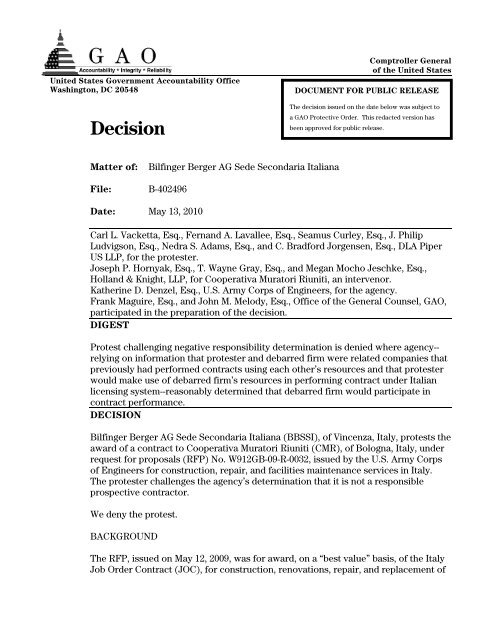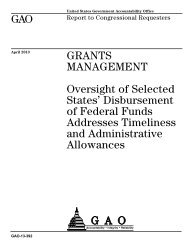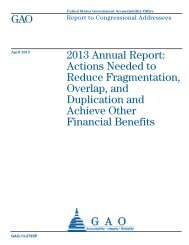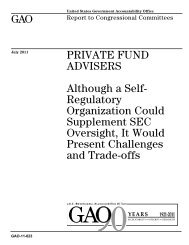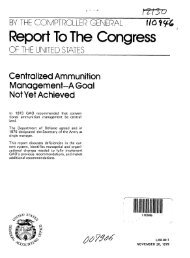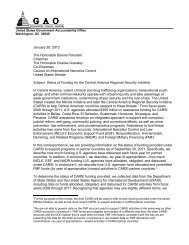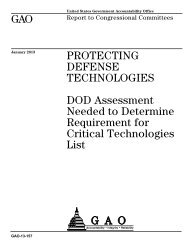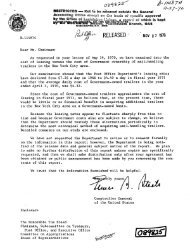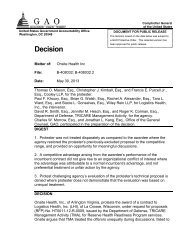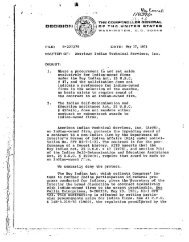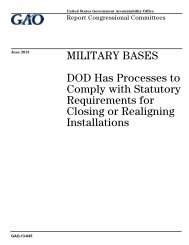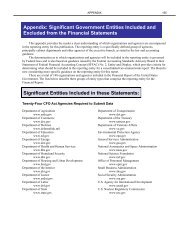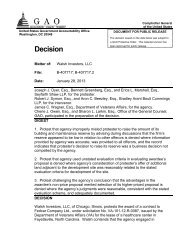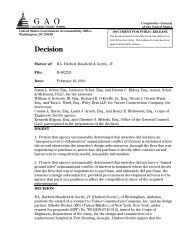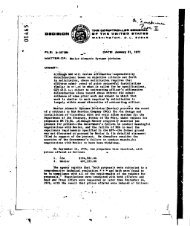B-402496 Bilfinger Berger AG Sede Secondaria Italiana
B-402496 Bilfinger Berger AG Sede Secondaria Italiana
B-402496 Bilfinger Berger AG Sede Secondaria Italiana
You also want an ePaper? Increase the reach of your titles
YUMPU automatically turns print PDFs into web optimized ePapers that Google loves.
United States Government Accountability Office<br />
Washington, DC 20548<br />
Decision<br />
Matter of: <strong>Bilfinger</strong> <strong>Berger</strong> <strong>AG</strong> <strong>Sede</strong> <strong>Secondaria</strong> <strong>Italiana</strong><br />
File: B-<strong>402496</strong><br />
Date: May 13, 2010<br />
Comptroller General<br />
of the United States<br />
DOCUMENT FOR PUBLIC RELEASE<br />
The decision issued on the date below was subject to<br />
a GAO Protective Order. This redacted version has<br />
been approved for public release.<br />
Carl L. Vacketta, Esq., Fernand A. Lavallee, Esq., Seamus Curley, Esq., J. Philip<br />
Ludvigson, Esq., Nedra S. Adams, Esq., and C. Bradford Jorgensen, Esq., DLA Piper<br />
US LLP, for the protester.<br />
Joseph P. Hornyak, Esq., T. Wayne Gray, Esq., and Megan Mocho Jeschke, Esq.,<br />
Holland & Knight, LLP, for Cooperativa Muratori Riuniti, an intervenor.<br />
Katherine D. Denzel, Esq., U.S. Army Corps of Engineers, for the agency.<br />
Frank Maguire, Esq., and John M. Melody, Esq., Office of the General Counsel, GAO,<br />
participated in the preparation of the decision.<br />
DIGEST<br />
Protest challenging negative responsibility determination is denied where agency-relying<br />
on information that protester and debarred firm were related companies that<br />
previously had performed contracts using each other’s resources and that protester<br />
would make use of debarred firm’s resources in performing contract under Italian<br />
licensing system--reasonably determined that debarred firm would participate in<br />
contract performance.<br />
DECISION<br />
<strong>Bilfinger</strong> <strong>Berger</strong> <strong>AG</strong> <strong>Sede</strong> <strong>Secondaria</strong> <strong>Italiana</strong> (BBSSI), of Vincenza, Italy, protests the<br />
award of a contract to Cooperativa Muratori Riuniti (CMR), of Bologna, Italy, under<br />
request for proposals (RFP) No. W912GB-09-R-0032, issued by the U.S. Army Corps<br />
of Engineers for construction, repair, and facilities maintenance services in Italy.<br />
The protester challenges the agency’s determination that it is not a responsible<br />
prospective contractor.<br />
We deny the protest.<br />
BACKGROUND<br />
The RFP, issued on May 12, 2009, was for award, on a “best value” basis, of the Italy<br />
Job Order Contract (JOC), for construction, renovations, repair, and replacement of
uilding systems, maintenance and repair of facilities, and other maintenance<br />
services at military installations in Italy. Agency Report (AR) at 1. Under the RFP,<br />
offerors were required to submit a Societa Organismi D’Attestazione (SOA), a<br />
certification evidencing compliance with Italian law regarding the qualifications of<br />
companies competing for public works contracts. RFP at 31-32; AR at 2. An SOA<br />
certifies a company to be qualified in particular categories and classifications of<br />
work. Id. at 3. BBSSI’s proposal included an SOA in the name of a related company,<br />
<strong>Bilfinger</strong> <strong>Berger</strong> Hochbau GmbH (BBH), a debarred contractor. Contracting<br />
Officer’s (CO) Statement at 11-12. Submission of an SOA in the name of another<br />
contractor is permissible in certain circumstances under a system called<br />
avvalimento, authorized by Italian law. Protest at 6; AR at 4.<br />
Following review of initial proposals, a competitive range was established,<br />
discussions were held, and final proposal revisions were received. CO’s Statement at<br />
17. After evaluation of final proposals, the contracting officer determined that<br />
BBSSI’s proposal was the best value. CO’s Statement at 20; AR exh. 19, Source<br />
Selection Decision Document (SSDD), at 001132.<br />
In considering BBSSI’s responsibility, however, the contracting officer found that<br />
BBSSI and BBH had an extremely close business relationship, based on their<br />
corporate relationship, government dealings with both firms on prior contracts in<br />
which their resources and assets had been used interchangeably, and BBSSI’s listing<br />
of contracts performed by BBH as experience and past performance in its proposal.<br />
SSDD at 001113-14; CO’s Statement at 22; AR at 7-11. The contracting officer<br />
concluded that BBSSI had provided “several indications that it is affiliated with<br />
[BBH],” and may have been “a mechanism for [BBH] to submit proposals and to<br />
continue to contract with the U.S. Government,” and that it therefore was necessary<br />
to review the “whole record … based on various evidence and documents that have<br />
been received from the contractor which indicate this relationship.” SSDD at<br />
001133. The contracting officer found substantial information in this regard. He<br />
notes, for example, that “8 out of the 10 projects submitted as Experience and Past<br />
Performance in [BBSSI’s] original proposal were performed by [BBH],” and that<br />
“discussions with field personnel administering current BBH and BBSSI contracts in<br />
Italy [indicated] that the same people and resources were performing work under<br />
both company names.” CO’s Statement at 22.<br />
The agency also obtained an opinion from an Italian legal expert to determine the<br />
effect of BBSSI’s use of BBH’s SOA. AR exh. 19, Opinion of Giorgio Cosmelli, Jan. 8,<br />
2010. The contracting officer’s interpretation of this opinion was that the SOA<br />
system is intended to provide assurance to contracting parties that they are dealing<br />
with qualified companies and that, although a contractor’s submission of an SOA in<br />
the name of another contractor is permissible, the system contemplates that the<br />
awardee will have full disposal of the resources of the firm holding the SOA. SSDD<br />
at 001134. The contracting officer concluded that, because of BBSSI’s use of BBH’s<br />
SOA, BBSSI would have “full disposal of [BBH’s] assets and resource[s]--technical,<br />
Page 2 B-<strong>402496</strong>
financial, employees, machinery, know-how, organization, economic and financial<br />
standing,” and would likely avail itself of those assets. SSDD at 001134.<br />
Based on these circumstances showing both a close relationship between BBSSI and<br />
BBH, and the appearance that BBH would participate in performance of the<br />
contract, the contracting officer determined that BBH was indirectly offering on the<br />
solicitation through BBSSI. The contracting officer also concluded that BBSSI was<br />
not a responsible offeror and was not eligible to receive the award. See Federal<br />
Acquisition Regulation (FAR) § 9.104-1; SSDD at 001134; CO’s Statement at 22.<br />
Award was made to CMR on January 28, 2010. This protest followed.<br />
DISCUSSION<br />
BBSSI generally challenges the contracting officer’s negative responsibility<br />
determination. It specifically asserts that the determination was unreasonable, since<br />
it advised the agency that it would perform the contract without any involvement of<br />
BBH. Protest at 11-12. Further, the protester asserts that the Cosmelli opinion, as<br />
interpreted by the contracting officer, could not form the basis for a reasonable<br />
nonresponsibility determination. Supp. Protest, Mar. 12, 2010. BBSSI also asserts<br />
that the SOA requirement was a definitive responsibility criterion, which it satisfied.<br />
Protest at 9-13. Finally, the protester asserts that the contracting officer’s<br />
determination constituted a wrongful de facto debarment. Protest at 19-20.<br />
In making a negative responsibility determination, a contracting officer is vested<br />
with a wide degree of discretion and, of necessity, must rely upon his or her business<br />
judgment in exercising that discretion. Although the determination must be factually<br />
supported and made in good faith, the ultimate decision appropriately is left to the<br />
agency, since it must bear the effects of any difficulties experienced in obtaining the<br />
required performance. For these reasons, we generally will not question a negative<br />
determination of responsibility unless the protester can demonstrate bad faith on the<br />
part of the agency or a lack of any reasonable basis for the determination. Miklin<br />
Corp., B-236746.2, Jan. 19, 1990, 90-1 CPD ¶ 72 at 1-2, recon. den., B-236746.3, June 8,<br />
1990, 90-1 CPD ¶ 540; see, e.g., Blocacor, LDA, B-282122.3, Aug. 2, 1999, 99-2 CPD<br />
¶ 25. Our review is based on the information available to the contracting officer at<br />
the time the determination was made. Acquest Dev. LLC, B-287439, June 6, 2001,<br />
2001 CPD ¶ 101 at 3.<br />
Here, as indicated above, based on the information available to him, the contracting<br />
officer concluded that BBSSI had provided indications that it may have been “a<br />
mechanism for [BBH] to submit proposals and to continue to contract with the U.S.<br />
Government.” SSDD at 001133. In support of this conclusion, the agency supplies a<br />
statement by the head of its contract administration office, who states that “the same<br />
personnel have simultaneously represented [BBSSI and BBH] on the contracts we<br />
have administered there both prior to and during the period in which BBH has been<br />
debarred,” and that there has been “no differentiation between the operations,<br />
insofar as the same key personnel have been identified and have signed documents<br />
Page 3 B-<strong>402496</strong>
for contracts with both companies.” AR exh. 15a, Declaration of William Thievon,<br />
Mar. 4, 2010; see AR exh. 15d (organizational chart showing identical <strong>Bilfinger</strong><br />
representatives on BBSSI and BBH contracts). The agency asserts that the two firms<br />
utilized common facilities and equipment, common and shared employees, including<br />
key personnel and management, and common bank accounts and that this resulted<br />
in the lack of a practical differentiation between either company in their daily work.<br />
AR at 7, 18.<br />
The protester generally does not dispute the information on which the agency based<br />
its determination. Rather, it asserts that the information is irrelevant, since it does<br />
not “invalidate the very clear and explicit representation in BBSSI’s discussion<br />
response, whereby it was unequivocally represented that BBSSI would perform on<br />
this [contract] without any involvement of BBH.” Comments at 25 (emphasis in<br />
original).<br />
We find that the extensive information on which the contracting officer relied fully<br />
supported the view that BBSSI and BBH were closely related, and the resultant<br />
appearance that BBH, a debarred contractor, would be involved in performing the<br />
contract, as it had been under prior contracts. Debarred contractors generally may<br />
not receive contracts from the government or subcontracts from government<br />
contractors, and “are also excluded from conducting business with the Government<br />
as agents or representatives of other contractors.” FAR § 9.405. Further, the FAR<br />
prohibits debarred firms from submitting offers for government contracts either<br />
directly or “indirectly (e.g., through an affiliate).” FAR § 9.403 (definition of<br />
“contractor”) and § 9.405(a) (“contractors” debarred, suspended, or proposed for<br />
debarment are excluded from receiving contracts); Detek, Inc., B-261678, Oct. 16,<br />
1995, 95-2 CPD ¶ 177 (firm not eligible for award where circumstances indicated that<br />
debarred affiliate was attempting to submit offer through affiliated offeror). While<br />
BBSSI represented that BBH would not participate in performance, the contracting<br />
officer was not required to take BBSSI’s representations at face value; he reasonably<br />
could rely on the historical and other information evidencing a close working<br />
relationship between BBSSI and BBH in concluding that BBH essentially was<br />
proposing through BBSSI, and that BBSSI therefore was nonresponsible.<br />
We also find that the contracting officer’s concerns about BBSSI’s reliance on BBH’s<br />
SOA was reasonable. SSDD at 001133-34. Based on the Cosmelli opinion, the<br />
contracting officer found that BBSSI’s use of BBH’s SOA further supported the<br />
conclusion that BBH would be involved in contract performance and was essentially<br />
offering on the solicitation through BBSSI. Id. The protester asserts that its use of<br />
BBH’s SOA was “simply for the sake of satisfying the ministerial requirement of<br />
having a SOA certificate,” Protest at 11-12; AR at 3, and reiterates that it intended to<br />
perform the contract wholly by itself, without participation by BBH. Again, however,<br />
the agency was not bound to accept BBSSI’s representations and disregard its SOA<br />
arrangement with BBH, together with the other substantial information bearing on<br />
the firms’ relationship.<br />
Page 4 B-<strong>402496</strong>
The protester asserts that the legal opinion reviewed by the agency could not form<br />
the basis for a reasonable nonresponsibility determination due to deficiencies in the<br />
agency’s acquisition of the opinion, the opinion itself, and the contracting officer’s<br />
interpretation of the opinion. Comments at 4-21; Supp. Protest, Mar. 12, 2010. In this<br />
regard, the protester asserts that the Request for Quotations seeking the legal<br />
opinion did not provide sufficient background material, including information setting<br />
forth BBSSI’s views regarding the legal effect of the SOA. Comments at 4-9, 18-21.<br />
We do not agree with BBSSI, however, that the absence of its views from the RFQ<br />
diminished the reliability of the opinion. 1 The RFQ adequately described the subject<br />
matter the opinion was to address, and there was no requirement that the agency<br />
turn the opinion into a vehicle for debate by setting forth BBSSI’s views on the<br />
matter. Contracting officers generally are entitled to rely on information available to<br />
them at the time of a responsibility determination, absent any indication that the<br />
information is defective, unsupported, or suspect. M. Matt Durand, LLC, B-401793,<br />
Nov. 23, 2009, 2009 CPD ¶ 241 at 7.<br />
BBSSI also asserts that the agency misinterpreted the legal opinion and that the<br />
opinion does not support the contracting officer’s conclusions. Comments at 9-11,<br />
15-19. However, BBSSI has not established that the agency’s interpretation of the<br />
opinion was incorrect or unreasonable. The opinion comments on the law<br />
surrounding an SOA, rather than the precise question of one firm’s use of another<br />
firm’s SOA. However, the opinion does indicate that, under the SOA system, a<br />
contractor may “prove to have the technical capabilities and the economic and<br />
financial standing necessary” to compete for the award of a public contract “by<br />
relying on the resources … of other entities, provided that, in such case, the bidder<br />
can prove to the contracting authority that it will have in its disposal the resources of<br />
such other entities to carry out the works.” Cosmelli Opinion at 3-4. The opinion<br />
also indicates that “the bidder who intends to avail itself of the third party’s<br />
resources shall produce … a declaration certifying that it intends to avail itself of the<br />
third party’s resources in order to meet the necessary requirements … .” Id. at 5.<br />
These statements are all reasonably supportive of the contracting officer’s<br />
conclusion that BBSSI’s reliance on BBH’s SOA was indicative of an intent to “have<br />
at its disposal the resources of [BBH] to carry out the [contract].” SSDD at 001134.<br />
The protester has provided no definitive information, other than its own legal<br />
opinion, establishing that the law permits it to use another firm’s SOA without<br />
involving that other firm in performance of the contract. 2<br />
1 We note, however, that the RFQ did include substantial text excerpted from a<br />
BBSSI attorney’s e-mail to agency counsel, setting forth BBSSI’s position regarding<br />
the effect of the SOA. RFQ at 3-4. We also note that some of the documentation<br />
BBSSI asserts the agency failed to include in the RFQ actually postdates the issuance<br />
of the RFQ. Comments at 6-9, 19-20.<br />
2<br />
The contracting officer further concluded, based on the legal opinion, that because<br />
of BBSSI’s use of BBH’s SOA, BBSSI actually would be required to make use of<br />
(continued...)<br />
Page 5 B-<strong>402496</strong>
BBSSI also asserts that the SOA requirement was a definitive responsibility criterion,<br />
which it satisfied when it submitted BBH’s SOA, and that further examination of the<br />
SOA is unwarranted and an improper application of an unstated evaluation factor.<br />
Protest at 9-13. This argument is without merit. BBSSI was not found<br />
nonresponsible due to failure to meet the solicitation requirement for submission of<br />
an SOA; rather, it was found nonresponsible based on the circumstances discussed<br />
above and its submission of BBH’s SOA. FAR part 9.4.<br />
Finally, the protester asserts that the contracting officer’s negative responsibility<br />
determination constituted a wrongful de facto debarment, without affording BBSSI<br />
the procedural protections of FAR § 9.406-1(b). This argument is without merit. A<br />
de facto debarment occurs when the government uses nonresponsibility<br />
determinations as a means of excluding a firm from government contracting or<br />
subcontracting, rather than following the debarment regulations and procedures set<br />
forth at FAR subpart 9.4. Firm Erich Bernion GmbH, B-233106, Dec. 28, 1988,<br />
88-2 CPD ¶ 632 at 4. A necessary element of a de facto debarment is that an agency<br />
intends not to do business with the firm in the future. Id.; Lida Credit Agency,<br />
B-239270, Aug. 6, 1990, 90-2 CPD ¶ 112 at 3 n.2. The nonresponsibility determination<br />
here was based on current information regarding BBSSI and BBH’s close business<br />
relationship, and BBSSI’s use of BBH’s SOA. The record does not show that the<br />
agency intends to exclude the firm from other procurements based on its specific<br />
determination here.<br />
The protest is denied.<br />
Lynn H. Gibson<br />
Acting General Counsel<br />
(...continued)<br />
BBH’s assets as a matter of law. SSDD at 1134. While BBSSI again disputes the<br />
contracting officer’s interpretation, Comments at 4-21, it has not established that this<br />
interpretation is incorrect. In any case, in light of our findings above, this conclusion<br />
is not essential to a finding that the agency acted reasonably.<br />
Page 6 B-<strong>402496</strong>


